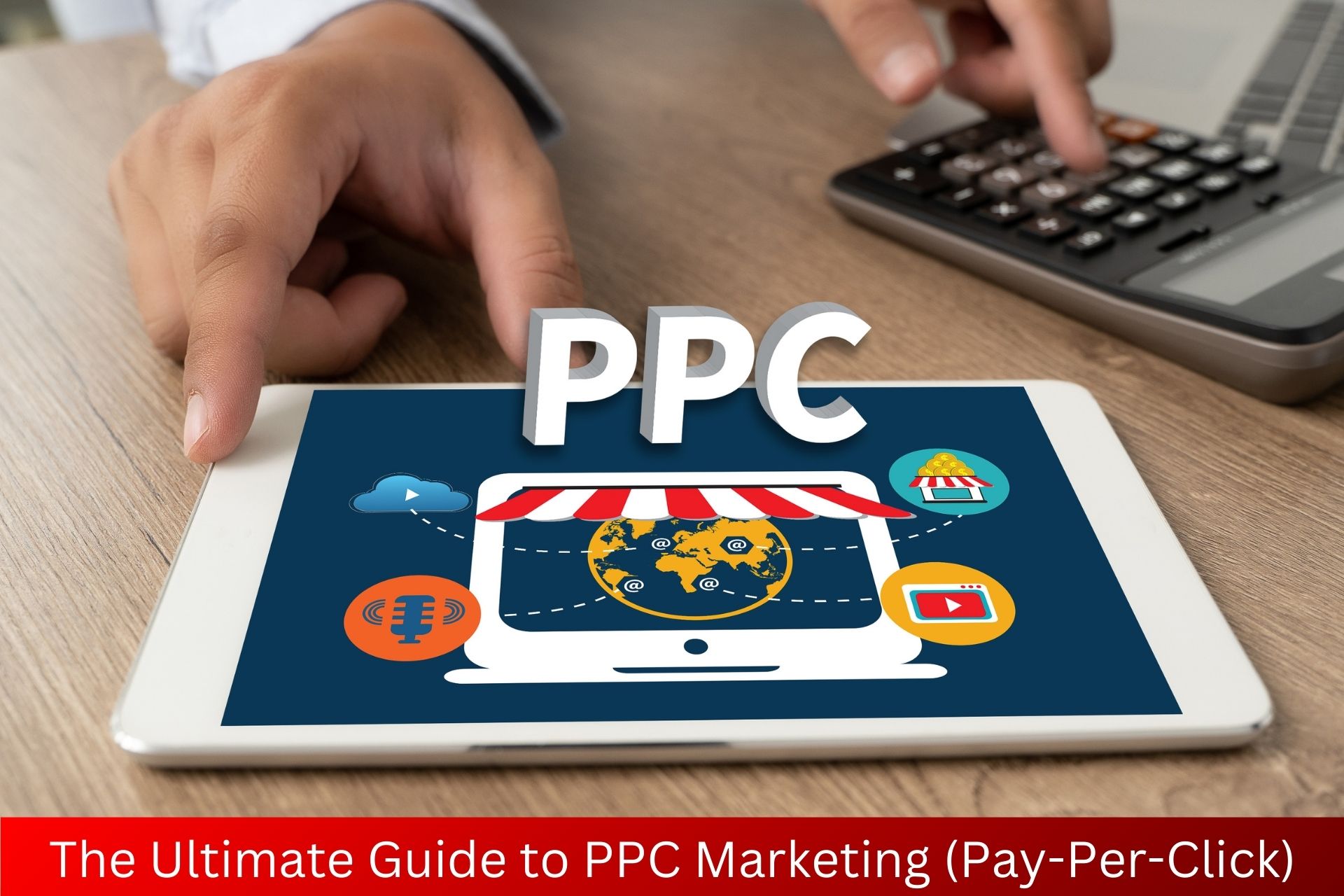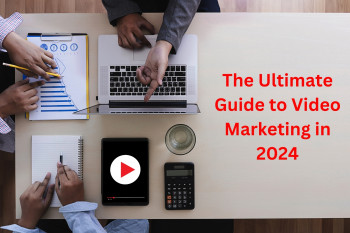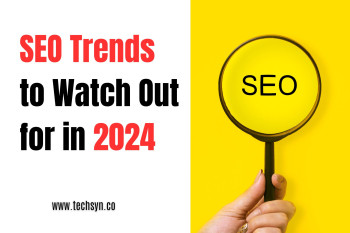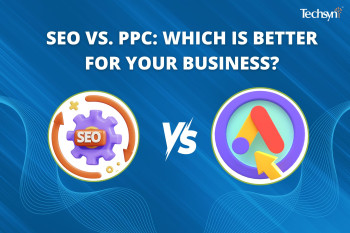PPC (Pay-Per-Click) marketing has emerged as one of the most effective and efficient forms of online advertising. With its ability to drive targeted traffic to your website and generate immediate results, PPC has become an essential component of any successful digital marketing strategy. However, navigating the world of PPC can be overwhelming and complex, especially for those new to the concept. That's why we have created this ultimate guide to PPC marketing, to provide you with a comprehensive understanding of what PPC is, how it works, and how you can use it to achieve your marketing goals. So, let's start by getting to know each topic in brief.
What is PPC Marketing?
PPC marketing is a digital advertising model where advertisers pay a fee each time their ad is clicked. It is a strategic approach to directing traffic to websites, as opposed to earning visits organically. By bidding on relevant keywords, advertisers can secure ad placement on search engine results pages, ensuring visibility to users actively searching for related products or services.
PPC advertising empowers businesses to amplify their online presence, drive traffic to their websites, and ultimately boost conversions by strategically targeting potential customers.
How Does PPC Advertising Work?
PPC advertising operates on a competitive bidding system, where advertisers bid on keywords relevant to their target audience. When a user enters a search query matching the keywords, the search engine triggers an auction to determine which ads will be displayed. The winning ad is showcased prominently, and if a user clicks on it, the advertiser incurs a cost based on the bid amount and ad quality.
This pay-for-performance model ensures that advertisers only pay when their ad generates tangible user engagement, making PPC a cost-effective and results-driven marketing strategy for businesses of all sizes.
Benefits of using PPC Advertising for Businesses
1) PPC offers immediate visibility, allowing businesses to reach their target audience at the precise moment when they are actively searching for relevant products or services. This real-time targeting capability enhances the likelihood of converting leads into customers, thereby maximizing ROI.
2) PPC provides unparalleled control over ad spend, enabling advertisers to set daily budgets, adjust bids, and target specific demographics, locations, and devices. This granular level of control empowers businesses to optimize their campaigns in real time, ensuring maximum efficiency and effectiveness.
3) PPC offers measurable results through robust analytics tools that track key performance metrics such as click-through rates, conversion rates, and cost per acquisition. This data-driven approach allows businesses to evaluate the success of their campaigns, identify areas for improvement, and make informed decisions to enhance campaign performance.
In essence, PPC advertising equips businesses with the tools and insights needed to engage with their target audience, drive relevant traffic to their website, and achieve tangible business results in a competitive digital landscape.
Must Read: SEO Vs. PPC: Which Is Better For Your Business?
Best Pay-Per-Click Platforms
When it comes to choosing the best PPC platforms for your business, several options stand out as industry leaders in the digital advertising space. Google Ads, the flagship PPC platform by Google, offers unparalleled reach and targeting capabilities across search, display, and video channels. With its expansive network and sophisticated algorithms, Google Ads enables advertisers to create highly targeted campaigns that resonate with their desired audience segments.
Bing Ads, the advertising platform by Microsoft, provides an alternative to Google Ads, reaching users across the Bing search engine and its partner sites. While Bing may have a smaller market share compared to Google, it offers unique audience demographics and lower competition, making it a valuable platform for businesses looking to diversify their PPC advertising strategy.
Social media platforms like Facebook Ads and LinkedIn Ads have also emerged as prominent players in the PPC landscape, offering advanced targeting options and ad formats to engage with users on a more personal level. With features such as demographic targeting, interest-based targeting, and retargeting, social media platforms enable businesses to tailor their ads to specific audience segments and drive engagement through interactive and visually appealing creatives.
PPC platforms with the right business objectives and target audience can help advertisers expand their reach, enhance brand visibility, and increase conversions.
Types of PPC Ads
PPC advertising include various ad formats designed to cater to different marketing objectives and audience preferences. Understanding the different types of PPC ads can help businesses tailor their campaigns to achieve specific goals and maximize their advertising impact.
1. Search Ads: Search ads are text-based ads that appear at the top of search engine results pages (SERPs) in response to user queries. These ads are triggered by specific keywords and are displayed prominently to users actively searching for related products or services. Search ads are highly effective for capturing user intent and driving immediate click-throughs to a website.
2. Display Ads: Display ads are visual ads that appear on websites within the Google Display Network, reaching users as they browse the internet. These ads can include images, videos, and interactive elements, making them an engaging and visually appealing format for brand awareness and remarketing campaigns. Display ads allow businesses to showcase their products or services to a broader audience and reinforce brand messaging through compelling visuals.
3. Video Ads: Video ads are ads that appear on video platforms such as YouTube, engaging users through immersive and interactive video content. With video ads, businesses can captivate audiences, tell compelling stories, and showcase products or services in a dynamic and visually appealing format. Video ads are effective for driving brand awareness, engagement, and conversions by leveraging the power of sight, sound, and motion to connect with viewers on an emotional level.
4. Remarketing Ads: Remarketing ads target users who have previously visited a website or interacted with a brand but did not complete a desired action, such as making a purchase. By retargeting these users with personalized ads based on their past interactions, businesses can re-engage them, nurture leads, and encourage conversions. Remarketing ads are a powerful way for increasing brand recall, reinforcing messaging, and driving repeat visits to a website.
With a mix of search, display, video, and remarketing ads, businesses can diversify their advertising strategy, engage users across different touchpoints, and drive conversions through targeted and compelling ads.
PPC Marketing Best Practices: Tips for Better Results
To achieve optimal results from your PPC campaigns, it's essential to adhere to best practices and implement strategic tactics that maximize your advertising impact. Following these tips, you can enhance the performance of your PPC campaigns, improve your return on investment, and drive meaningful results for your business.
1. Conduct Comprehensive Keyword Research: Before launching your PPC campaigns, conduct thorough keyword research to identify relevant keywords that align with your business objectives and target audience. Use keyword research tools to discover high-intent keywords, long-tail keywords, and negative keywords that can help you refine your targeting and maximize your ad relevance.
2. Optimize Ad Copy and Landing Pages: Craft compelling ad copy that resonates with your target audience and entices users to click on your ads. Use persuasive language, relevant keywords, and clear calls to action to drive engagement and encourage conversions. Ensure that your landing pages are optimized for conversion, with a seamless user experience, relevant content, and a clear path to conversion.
3. Test Different Ad Creatives: A/B test different ad creatives to identify which messaging, imagery, and offers resonate best with your audience. Experiment with variations in ad copy, headlines, visuals, and calls to action to determine the most effective combination that drives engagement and conversions. Continuously test and refine your ad creatives to optimize performance and maximize results.
4. Monitor Performance Metrics: Track key performance metrics such as click-through rates, conversion rates, cost per click, and return on ad spend to evaluate the effectiveness of your PPC campaigns. Use analytics tools to gain insights into user behavior, campaign performance, and areas for improvement. Monitor performance metrics regularly and make data-driven decisions to optimize your campaigns and achieve better results.
5. Adjust Campaigns Based on Data Analysis: Use data analysis to identify trends, patterns, and opportunities for optimization within your PPC campaigns. Make data-driven decisions to adjust your bidding strategy, ad targeting, and budget allocation based on performance metrics and user behavior. By continuously analyzing data and optimizing your campaigns, you can improve ad relevance, enhance user engagement, and drive better results for your business.
6. Work with a Reputable PPC Advertising Company: Consider partnering with a reputable PPC advertising company to leverage their expertise, industry insights, and resources to maximize the effectiveness of your PPC campaigns. A skilled PPC agency can help you develop targeted strategies, optimize campaign performance, and achieve your business goals through customized and data-driven advertising solutions.
Using these best practices and tips, businesses can maximize the potential of PPC marketing, drive targeted traffic to their websites, and achieve tangible results. With a strategic approach, continuous optimization, and a focus on delivering value to users, businesses can harness the power of PPC advertising to elevate their online presence, expand their reach, and drive sustainable growth.
Final Words
PPC marketing is a versatile and impactful tool for businesses seeking to connect with their target audience, drive conversions, and achieve their marketing objectives in a competitive online environment. Businesses can create successful PPC campaigns that deliver measurable outcomes and drive business growth by understanding PPC marketing fundamentals, leveraging the best PPC platforms, exploring various types of PPC ads, and utilizing the best practices and tips shared in this guide, you can create successful campaigns that deliver real results.










